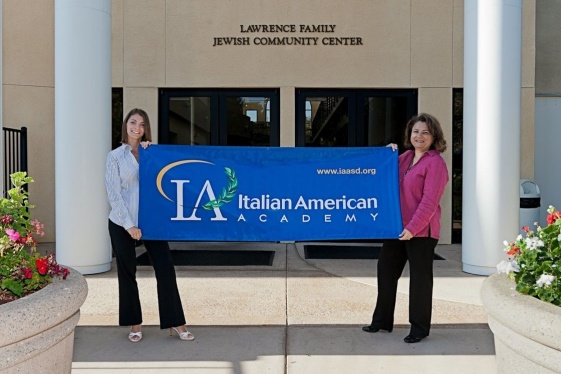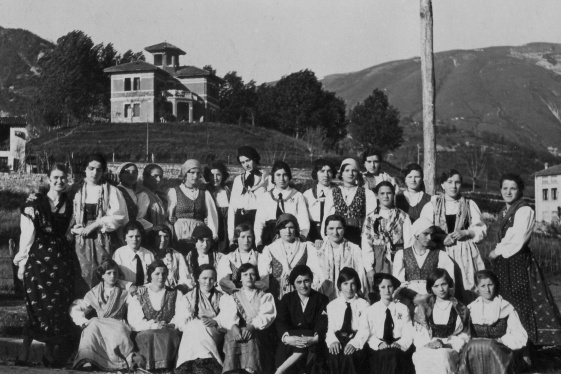Italian language: I Finally Understood, Anche io!
And we’re back with our grammar lesson. Today we are going to look at specific expressions, in particular the difference in use between anche io and anche a me and anche tu and anche a te. Let’s go! I have to take first a step back and take a look at what io, tu, me and te are. Both io and me refer to the pronoun “I.” Io is the English equivalent o...
READ MOREFederica Santini Named Interim Chair, Department of World Languages and Cultures
Beginning August 1, 2022, Federica Santini will take the position of interim chair of the Department of World Languages and Cultures (WLC). Most recently, Santini was the Coordinator of Gender and Women's Studies and Professor of Italian and Interdisciplinary Studies. In her new role, she will focus on supporting department’s faculty in implementin...
READ MOREJobs: Executive Director of Italian Language Programs (Part-Time) at N.O.I. (Nuovi Orizzonti Italiani) Foundation Inc.
The Foundation N.O.I. (Nuovi Orizzonti Italiani) – Ente Gestore for the promotion of the Italian Language and Culture within the Jurisdiction of the Consulate of Italy in Detroit- announces the opening of a position as Executive Director of Italian Language Programs beginning September 1st, 2022. Candidates are asked to provide NOI Foundation Board...
READ MOREItalian Academy for Advanced Studies to Premiere ‘Being Ariodante’
The Italian Academy for Advanced Studies at Columbia University will present “Being Ariodante” on May 13-14, 2022. The opera, which was written by American composer Jonathan Dawe, will be conducted by Benjamin Grow and stars Bryce McClendon, Dickie Hearts, Sydney Anderson, Richard Pittsinger, Cree Carrico, Vako Gvelesiani, Gil Sweeney, and Chris Bu...
READ MOREItalian language: Happy as an Easter!
This month we’ve celebrated Easter, so I couldn’t help but to talk about it! Of course, I’ll give you a linguistic interpretation, so this month we’ll talk about Easter in the Italian language. Let’s take a look. After what feels like a very long quaresima, “Lent,” full of sacrifices and penitence, Pasqua, “Easter,” finally comes and brings a lot o...
READ MORE‘Let’s Choose Three Words’: the Project dedicated to Innovative Italian Language is now launched
‘Let’s Choose Three Words’ is a new educational project promoted by the Ministry of Foreign Affairs and International Cooperation-Directorate General for Public and Cultural Diplomacy, “Ufficio V”. Students of the Italian secondary schools, the Italian sections and the European schools abroad are invited to write some texts in Italian focusing on n...
READ MOREThe Art (and Value) of Italian Hand Gestures
Whether born of the necessity to persuade crowds in Ancient Rome, or to be able to understand one another during times of foreign occupation–or even to compete for attention in a densely populated city– the bottom line is indisputable: Italians have been using gestures to communicate for centuries. And as far as I know, they have no plans to stop;...
READ MOREGoodbye from the Italian American Academy in San Diego
Cari genitori e amici della IAASD, this is to inform you that IAASD has decided to permanently close its doors in June 2022. These 10 years of activity were wonderful, challenging and extremely satisfying for us. We started out without knowing how far we could go or how long we could last, but our determination and hardwork prevailed. Over the year...
READ MORETranslation awards and contributions 2022
The Ministry of Foreign Affairs and International Cooperation promotes the distribution of publications and cinematographic works abroad by offering incentives for translation and dubbing or subtitling. The Farnesina provides two types of financial incentives: - Contributions for the translation of an unpublished work and for the production, dubbin...
READ MOREPaesano, History of a forgotten concept
The words that we use determine how we see the world and an ambiguous word in the Italian language explains why many descendants of Italian migrants have a limited concept of our country. All too often we blame the lack of schooling as the reason for the ignorance of Italy, as well as of its habits, history and Culture of migrants and consequently...
READ MORE











